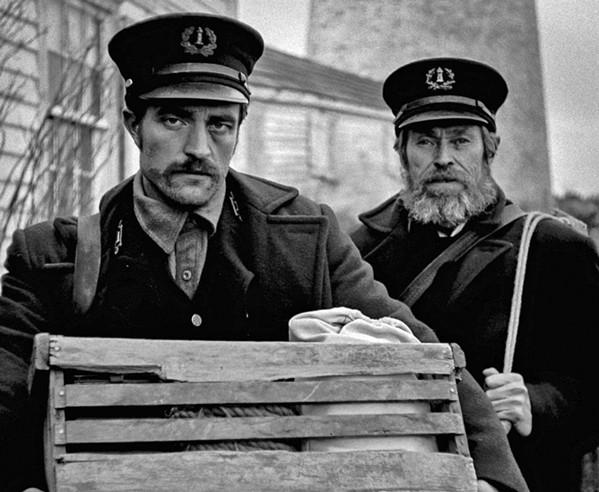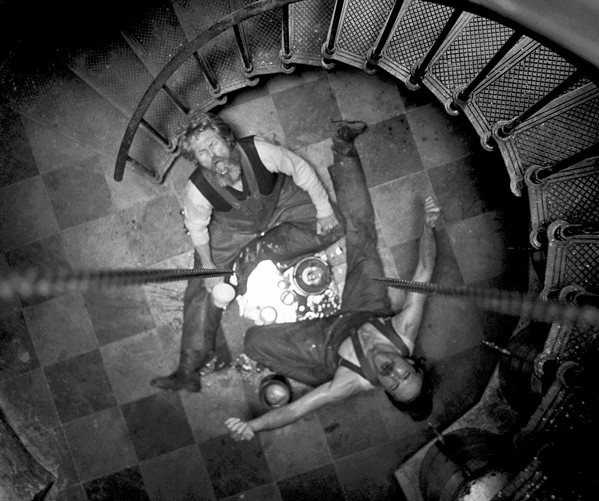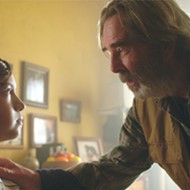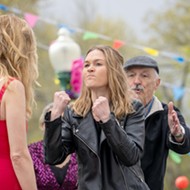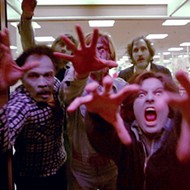[{
"name": "Ad - Medium Rectangle CC01 - 300x250",
"id": "AdMediumRectangleCC01300x250",
"class": "inlineCenter",
"insertPoint": "8",
"component": "2963441",
"requiredCountToDisplay": "12"
},{
"name": "Ad - Medium Rectangle LC01 - 300x250",
"id": "AdMediumRectangleCC01300x250",
"class": "inlineCenter",
"insertPoint": "18",
"component": "2963441",
"requiredCountToDisplay": "22"
},{
"name": "Ad - Medium Rectangle LC09 - 300x250",
"id": "AdMediumRectangleLC09300x250",
"class": "inlineCenter",
"insertPoint": "28",
"component": "3252660",
"requiredCountToDisplay": "32"
}]
Co-writers Robert and Max Eggers, with Robert (The Witch) directing, have created a psychological fantasy-horror film about two lighthouse keepers—Thomas Wake (Willem Dafoe) and Ephraim Winslow (Robert Pattinson)—stuck together on a remote New England island as they slowly descend into madness (black and white; 109 min.)
Glen This is a weird one. As director Robert Eggers said in interviews, "Nothing good can happen when two men are trapped alone in a giant phallus." Even the aspect ratio, a nearly square 1:19, creates a claustrophobic feeling. Add in the black and white film stock and a soundtrack by Mark Korven that mixes ominous foghorn with a nod to the frenetic sounds of Hitchcock's favorite composer, Bernard Herrmann, and you've got the makings of a very unsettling and uncomfortable environment for two strangers to find themselves stuck in. The entire exterior set was built on Cape Forchu, Nova Scotia, and the horrible weather depicted was often real—three storms blew through during the 35-day shoot. On top of that, because of the black-and-white film stock, the lighting had to be blindingly bright to show up on film. I read that the crew wore sunglasses and that the actors could barely see each other. The filming must have been grueling and horribly uncomfortable. All this attention to detail and in-the-moment realism translates into a surprising and unusual viewing experience. It also features two remarkable and deeply committed performances. This is nothing like most films coming out of Hollywood. Instead, it feels like early filmmaking—think Fritz Lang (Metropolis, 1927; M 1931) or G.W. Pabst (Adventures of Don Quixote, 1933). All that said, you just might hate this film. I was fascinated watching it but also bewildered and grossed out a bit. It's a raw and depressing story of madness or maybe an inky black comedy. Perhaps both.
Anna The Lighthouse is certainly a triumph in intricate filmmaking, but while the feelings it floods its audience with are uncomfortable, they are also raw and unconventional. It's not a feel-good story, not even for a brief moment. Not everyone is going to love the experience; it's an oppressive and grueling beast. That said, there is also humor here—the director is unafraid to make the audience giggle from an ongoing flatulence bit. The two men at the center of it all are incredible powerhouses on the screen, and my eyes couldn't look away even when the rest of me was ready to flee that godforsaken rock and the madness slowly closing in on it. Wake (Dafoe) is the grim and elderly lighthouse keeper who has held his post for far too long, drinking his way into madness long before Winslow (Pattinson) arrives. Wake is grisly and mean, crippled by a bad leg. Winslow is young and ready to work, but his resentment for Wake is close to the surface and his own demons start to haunt him soon enough. The claustrophobic feel of the black-and-white cinematography, the oppressive and constant sounds of the foghorn, and the sheer fact that there isn't a moment where these two aren't waterlogged by the outside storms make for not just a movie viewing but an uncomfortable experience—and one that I'll be thinking about for quite a while.
Glen There's certainly a lot of layers going on. Winslow discovers a carved mermaid figure tucked into a hole in his mattress, and it acts as both a focus of his carnal desires and a bad omen that haunts him. Wake is very superstitious, and when Winslow tries to drive off a seagull, Wake warns him that it will bring them both bad luck. It's all very Greek tragedy/mythology, with ominous soliloquies, curses thrown around, and fever-dream sequences depicting mermaid sex, tentacles, and something spellbinding and magical within the ever-pulsing beam of the lighthouse—which Wake seems to want for himself and which Winslow increasingly covets. You know things aren't going to go well for these two, especially with the power differential. Wake farts in Winslow's direction and makes him do all the dirty work, from emptying their chamber pots to hauling coal and painting the lighthouse exterior while hanging haphazardly from ropes. It's hard to know who to root for. Wake is mean and unforgiving, but Winslow becomes increasingly menacing, and they're both bad drunks. There's also a lot of gay subtext, a lot of raw comic moments, and a lot of gross-out moments. Am I glad I saw The Lighthouse in the theater? Absolutely! Would I recommend it? Yes, to people who are cinephiles and who are open to unusual film going experiences. Will you like it? I honestly don't know, but you'd be hard pressed to find more careful filmmaking or more committed performances.
Anna The film feels like a fever dream itself; it's chaos compounded by madness all served up on a rock in the middle of the sea. The two actors apparently have very different rehearsal styles—while spending a week with director Robert Eggers in Halifax before filming, that much became evident. Dafoe was happy and eager to rehearse over and over again, while Pattinson much preferred to skip rehearsal and jump into the scene blindly, letting spontaneity guide his performance while filming. Whatever they did worked. These two are adept at playing off of each other, and they both are jaw-droppingly good here. I can't say it's necessarily an easy film to watch, or even particularly pleasant, but there's a whole lot here to like or at least appreciate. The oppressive nature of it comes across on the big screen, much more so than it will at home, so hit this one up during its stay at The Palm Theatre—just get yourself in the right mindset before you walk in. Δ
Split Screen is written by Senior Staff Writer Glen Starkey and his wife, Anna. Comment at [email protected].

